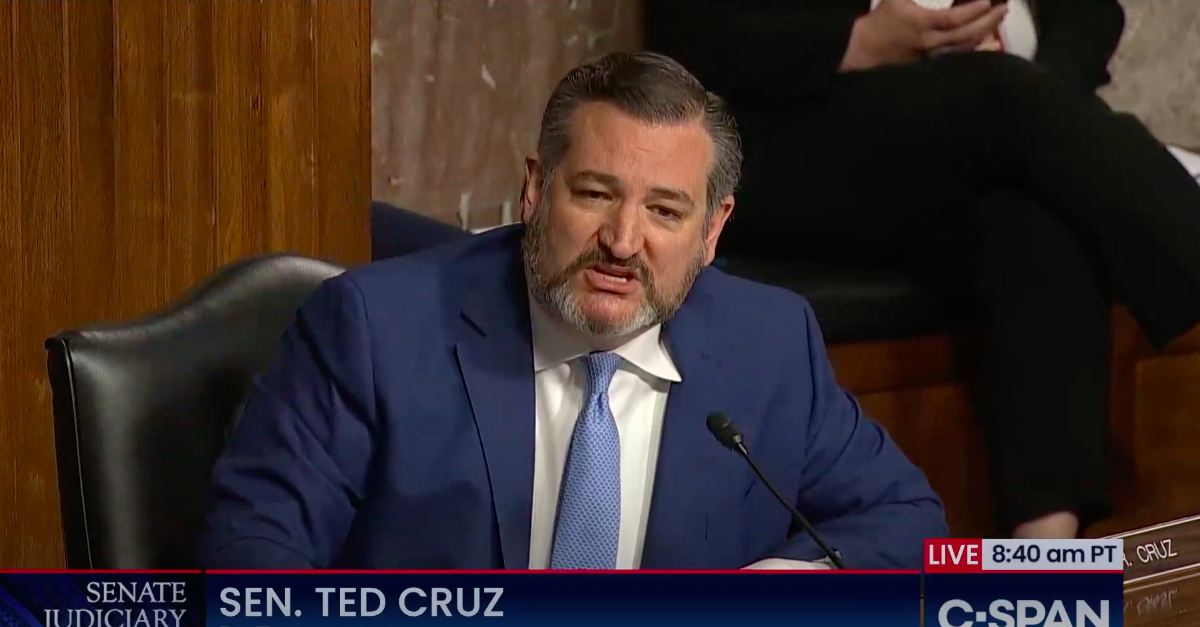
Texas Senator Ted Cruz (R) on Wednesday added a perplexing new caveat to the GOP’s contention that the Senate does not have jurisdiction over former U.S. officials, one that calls into question the position Cruz staked out on the Senate floor just one day prior.
An ardent opponent of Donald Trump’s impeachment, Cruz joined 43 of his Republican colleagues on Tuesday in voting to dismiss the charges against the former president because the chamber did not have jurisdiction to try now-private citizen Trump (see: Sec. 2).
Then on Wednesday, Cruz authored an op-ed for Fox News’ website in which he states, in the opening paragraph, “I believe that the better constitutional argument is that a former president can be impeached and tried—that is, that the Senate has jurisdiction to hold a trial.”
According to Cruz, the Senate’s jurisdiction over impeachment proceedings is discretionary, meaning the legislative body can choose when to exercise its jurisdiction similar to how the U.S. Supreme Court can grant certiorari or deny applications submitted to the justices.
“For example, the vast majority of the Supreme Court’s caseload arises on discretionary jurisdiction—it has the authority to hear most cases, but it doesn’t have to do so. And nothing in the Constitution makes the Senate’s impeachment jurisdiction mandatory. ‘Sole power’ means ‘sole power’—the Senate can decide whether to hear the case,” Cruz wrote. “However, nothing in the text of the Constitution requires the Senate to choose to exercise jurisdiction. In these particular circumstances, I believe the Senate should decline to exercise jurisdiction—and so I voted to dismiss this impeachment on jurisdictional grounds.”
Several legal experts argued the Senator’s convoluted argument does not stand up to scrutiny, as denying the existence of Senate jurisdiction over former officers is entirely different and far more consequential than simply declining to exercise that power.
Keith E. Whittington, a professor of politics at Princeton University who focuses on American constitutional theory and development, judicial politics, and the presidency, explained Cruz’s ill-conceived attempt to reconcile his positions in a post on the legal blog The Volokh Conspiracy.
“Cruz seems to think of the articles of impeachment as like a cert petition that the Senate can simply reject without explanation at a jurisdictional threshold. But that seems misguided. That would be inconsistent with current Senate rules, which do not suggest a cert-like process. It is also at odds with how the jurisdictional question was put to the Senate after the first day of the impeachment trial, which was whether Donald Trump was subject to the jurisdiction of the court of impeachment notwithstanding the expiration of his term of office,” Whittington wrote. “By voting nay on that question, Cruz implied that Trump was outside the scope of the Senate’s jurisdiction. If he had carried the day, the current Senate would have been understood to have reversed the Belknap precedent and altered the scope of the Senate’s jurisdiction going forward. There would have been real implications for the possibility of holding impeachment trials for former officers in the future. Nothing about that vote suggested ‘maybe next time.’”
Cruz’s op-ed even stated that his decision to vote against jurisdiction was based on the substantive case against Trump, not the constitutionality of the process.
Constitutional law professor Brian Kalt of Michigan State University School of Law and Professor Randall Eliason of George Washington University Law School similarly repudiated Cruz’s reasoning.
“Cruz says ‘the better constitutional argument is that a former president can be impeached and tried.’ He says the Senate has jurisdiction but should decline to use it here. But the motion he voted no on asked ‘can we?’ not ‘should we?,’” Kalt wrote, adding, “Still, I’m glad he agrees there’s jurisdiction.”
Eliason responded, saying Cruz’s argument “makes no sense.”
“If that’s what he believes the proper course would be to vote ‘yes’ on the jurisdiction question and then vote to acquit on the merits,” Eliason added.
[image via C-SPAN screengrab]